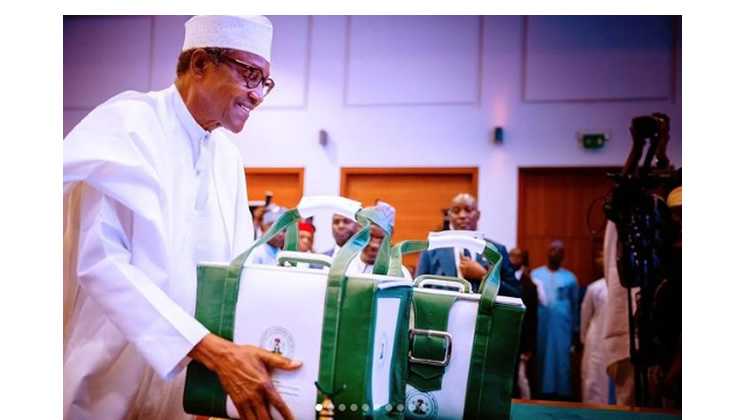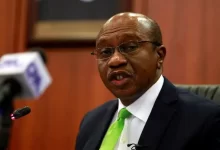N20.5tn budget: NACCIMA, LCCI, experts fault Buhari’s borrowing plan, subsidy

The President, Major General Muhammadu Buhari (retd.), on Friday, laid the 2023 Appropriation Bill before a joint session of the National Assembly. The bill was tagged, ‘Budget of Fiscal Sustainability and Transition.’
However, the key provisions in the proposed N20.51tn budget have attracted reactions from major stakeholders, including the Nigerian Association of Chambers of Commerce, Industry, Mines and Agriculture, Lagos Chamber of Commerce and Industry, economists and lawmakers, among others.
Planned expenditure
Of the N20.51tn budget, statutory transfers amount to N744.11bn; non-debt recurrent costs, N8.27tn; personnel costs, N4.99tn; pensions, gratuities and retirees’ benefits, N854.8bn; overheads, N1.11tn; capital expenditure, N5.35tn, including the capital component of statutory transfers; debt service, N6.31tn; and sinking fund of N247.73bn to retire certain maturing bonds.
In his presentation, Buhari said, “We expect total fiscal operations of the Federal Government to result in a deficit of N10.78tn. This represents 4.78 per cent of estimated GDP, above the three per cent threshold set by the Fiscal Responsibility Act 2007. As envisaged by the law, we need to exceed this threshold considering the need to continue to tackle the existential security challenges facing the country.
“We plan to finance the deficit mainly by new borrowings totalling N8.80tn: N206.18bn from privatisation proceeds and N1.77tn draw-downs on bilateral/multilateral loans secured for specific development projects/programmes.”
NASS committees’ illegality
Buhari also slammed committees of the National Assembly for allegedly bypassing him and approving budgets for government-owned enterprises without his approval.
He said, “Distinguished Senators, honourable members, you may recall that we earlier integrated the budget of government-owned enterprises into the FGN’s 2019 budget submission. This has helped to enhance the comprehensiveness and transparency of the FGN budget. It has, however, come to my attention that government-owned enterprises liaise directly with relevant NASS committees to have their budget passed and issued to them directly.
“I would like to implore the leadership of the National Assembly to ensure that the budget I lay here today, which includes those of the GOEs, be returned to the Presidency when passed. The current practice where some committees of the National Assembly purport to pass budgets for the GOEs, which are at variance with the budgets sanctioned by me, and communicate such directly to the MDAs, is against the rules and needs to stop.”
N470bn for schools
Buhari also announced N470bn in intervention fund for the revitalisation and salary enhancement of higher institutions. He, however, pointed out that the government would not sign any agreement with unions in the sector that it did not have the capacity to implement.
He said, “The government notes with dismay, the crisis that has paralysed activities in the public universities in the country. We expect the (members of) staff of these institutions to show a better appreciation of the current state of affairs in the country. In the determined effort to resolve the issue, we have provided a total of N470bn in the 2023 budget from our constrained resources, for revitalisation and salary enhancements in the tertiary institutions.
“It is instructive to note that today the government alone cannot provide the resources required for funding tertiary education. In most countries, the cost of education is jointly shared between the government and the people, especially at the tertiary level. It is imperative therefore that we introduce a more sustainable model of funding tertiary education.
“The government remains committed to the implementation of agreements reached with staff unions within available resources. This is why we have remained resolute that we will not sign any agreement that we would be unable to implement. Individual institutions would be encouraged to keep faith with any agreement reached in due course to ensure stability in the educational sector.”
High food costs
Buhari said the government is “very concerned” about the high food prices in the country, noting that various measures were being implemented to address structural factors underlying the issue, saying his regime would also step up its current efforts aimed at boosting food production and distribution in the country.
The President added, “Government is not unaware of the challenges confronting the manufacturing sector. We will ensure effective implementation of policy measures aimed at positioning the manufacturing sector to generate more foreign exchange in the near future. We are also committed to improving the business environment to stimulate local and foreign investment.”
‘Security top priority’
Buhari stated that the government remained “firmly committed” to the security of life, property and investments across the country. He noted that defence and internal security would continue to be accorded top priority in 2023.
He added that current efforts to properly equip and motivate the nation’s valiant personnel in the armed forces, the police and paramilitary units would be sustained.
“I assure you, insecurity, especially banditry and kidnapping, will be significantly curtailed before the end of this administration. We will redouble our efforts to ensure we leave a legacy of a peaceful, prosperous and secured nation,” he stated.
Discrepancies shock lawmakers
Members of the National Assembly, however, expressed shock over the irregularities between the estimates presented by the President and those contained in the 2023-2025 Medium Term Expenditure Framework and Fiscal Strategy Paper passed by the Senate and the House of Representatives during the week.
The Chairman of the House Committee on Media and Public Affairs, Benjamin Kalu, said the lawmakers only learnt about the major changes from the President while he was addressing the parliament.
In the MTEF/FSP, the Assembly had approved an aggregate Federal Government expenditure of N19.76tn made up of total recurrent (non-debt) of N8.53tn; personnel costs (MDAs) of N827.8bn; capital expenditure (exclusive of transfers), N3.96tn; special intervention (recurrent), N350bn; and special intervention (capital) of N7bn.
Also approved were crude oil production of 1.69 million barrels per day, 1.83mbpd and 1.83mbpd for 2023, 2024 and 2025, respectively; oil benchmark of $73 per barrel; and exchange rate of N437.57 to the United States dollar.
The lawmakers had also approved a projected Gross Domestic Products growth rate of 3.75 per cent and an inflation rate of 17.16 per cent.
They also passed N8.437tn for foreign and domestic borrowing; a fiscal deficit of N10.563tn, including GOEs; statutory transfers totalling N722.11bn; debt service estimate of N6.31tn; Sinking Fund to the tune of N247.7bn; as well as pension, gratuities and retirees’ benefits of N827.8bn.
While the Executive proposed N3.6tn for the payment of subsidy on Premium Motor Spirit, popularly known as petrol, till June 2023, the lawmakers had approved N1.7tn.
However, Buhari said based on the 2023-2025 MTEF/FSP passed by the parliament, the parameters for the budget included an oil price benchmark of $70 per barrel; projected oil production/output at 1.69 million barrels per day, inclusive of condensates of 300,000 to 400,000 barrels per day; exchange rate of N435.57 to a dollar; projected GDP growth rate of 3.75 per cent; and 17.16 per cent inflation rate.
The President said based on these fiscal assumptions and parameters, total federally-collectible revenue was estimated at N16.87tn in 2023, with the total federally distributable revenue estimated at N11.09tn, while total revenue available to fund the budget was put at N9.73tn, including from 63 government-owned enterprises.
Buhari also said oil revenue was projected at N1.92tn; non-oil taxes, N2.43tn; and independent revenues, N2.21tn. He added that other revenues would amount to N762bn, while the retained revenues of the GOEs were put at N2.42tn.
However, Kalu addressed journalists after the presentation and disclosed that the lawmakers got to know about the differences between the proposed budget and the MTEF during the session.
He stated, “When the MTEF was pushed out yesterday (Thursday), I am sure the Executive was not expecting that we would present N19tn as against the N20tn they probably had in mind. Remember that the Executive is at will to present what they feel is good for the nation.
“It is our duty to review what they have presented based on what we feel is also good for the nation. So, whatever they have presented, if it is not in line with the MTEF, we will look at it and see why. If we have means for any adjustment, that will be taken care of at the committee level. I don’t see that as a problem.
“We noticed today that MTEF was different from the budget. We will find out why and find a way to fix it. That is why it is coming back to the House. It is not a final document. If you remember also, the oil (price) projection, the House projected $73 per barrel but the Executive projected $70 per barrel.”
Senators differ
Senators, however, differed on the budgetary proposal, especially as it relates to fuel subsidy and borrowing.
The lawmaker representing Lagos Central Senatorial District, Senator Oluremi Tinubu, said there was nothing wrong about borrowing as long as the country was going to pay back.
“I will go against a government that will borrow and leave debt for the incoming administration or the country to inherit. If you borrow on a very healthy threshold, there is nothing wrong with it,” she said.
The Chairman of the Senate Committee on Appropriations, Senator Jibrin Barau, said, “He (Buhari) brought it (the budget) in a box. We will now go and unveil it and look at the proposal and analyse what is in there before we begin to respond to anything.”
Barau, however, said no government since the inception of the current democratic dispensation in 1999 had done as much as the Buhari regime.
“All we need to do is to continue from where the government stops next year. It is a long journey. Before you experience economic buoyancy, an enabling environment and infrastructure is one of the fundamentals needed,” he added.
Senator Kabiru Gaya also said the Senate would discuss the budget next week and hoped that the National Assembly would pass the bill before the end of November or early December.
“For other budgets, we borrowed money. So, we still have to. We hope that oil production will increase and social revenue too,” he said.
However, Senator Betty Apiafi stated that the budget was not implementable, noting, “Oil is a major revenue earner in this country; not only revenue, but it also earns foreign exchange for us. Right now, we are depleting our foreign reserves. Most of the foreign airlines are hardly flying into Nigeria anymore because they can’t remit the ticket money.



